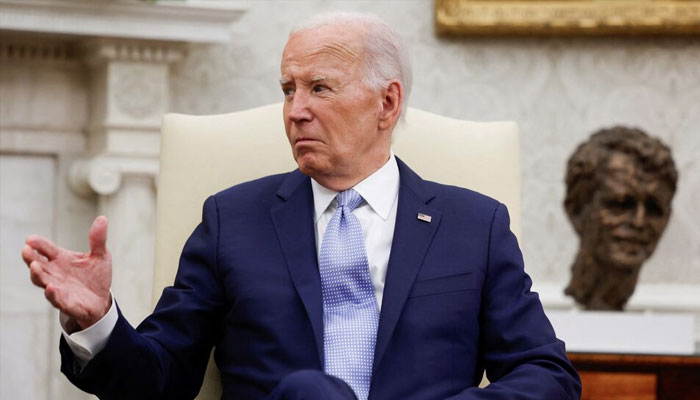Sanction hypocrisy
These sanctions seem an assertion of US dominance than genuine effort to foster nuclear-free world
The recent decision by the United States to impose sanctions on three Chinese companies supplying technology and equipment to Pakistan’s ballistic missile programme starkly illustrates the growing reach of American geopolitical ambitions. Announced just a week ago, these sanctions, under the guise of promoting ‘international security' seem more an assertion of US dominance than a genuine effort to foster a nuclear-free world. While the ideal of global disarmament is laudable, the current geopolitical climate necessitates that developing nations like Pakistan bolster their defences amid regional rivalries and security threats. The US has to understand that its political goals are different from that of a developing nation. The US decision comes at a time when Pakistan finds itself squeezed between two major rivals, having previously placed its trust – and much of its military dependence – in American hands. The abrupt cessation of military aid by a former US president and the directive to “do more” starkly highlighted the volatility of this partnership. Pakistan has to diversify its partnerships, and no country should have any objections to us increasing our military capabilities. In a press briefing on Tuesday (Sep 17), US State Department Spokesperson Matthew Miller said that while Pakistan had been a long-term partner of the US, there were disagreements and that the US “won’t hesitate to act on those to protect America’s interests”.
In a statement made to the media in response to queries regarding the US decision, Pakistan’s Ministry of Foreign Affairs said that the decision was “biased and politically motivated”. This seems true. The US has already started its trade war against China, with several tariffs being imposed to reduce imports from China, especially by the lucrative auto industry. It also roped in the EU and Canada to put pressure on China. Pushing Pakistan into this economic war is unjustified. The US should also consider why countries are getting wary of the Global North. The historical context of global power dynamics adds further weight to Pakistan’s position. The use of nuclear weapons in Japan in the 1940s was a grim chapter that spurred a global pledge to prevent such devastation from recurring. Yet, the ongoing conflicts in the MENA region – often fueled by the very superpowers that claim to uphold international norms – reveal a disturbing hypocrisy. The US, while decrying others’ military advancements, remains complicit in global conflicts that involve severe civilian casualties.
This has led to an important question: to what extent should the superpower be allowed to enjoy impunity? Is it justified to allow one country to cause death and destruction in countries around the world, but a smaller country should not be allowed to work on its military might? Why exactly should Pakistan live under false assumptions that the ‘international community’ would assist it in case of any regional conflicts? There is no denying that we should strive for a weapon-free world, but for that to happen, rich nations should stop investing in cyberdogs and other AI-powered weapons first. Till then, Pakistan as a sovereign state has all the rights to partner with companies that can help it expand its military capabilities.
-
 Winter Olympics 2026: Lindsey Vonn’s Olympic Comeback Ends In Devastating Downhill Crash
Winter Olympics 2026: Lindsey Vonn’s Olympic Comeback Ends In Devastating Downhill Crash -
 Adrien Brody Opens Up About His Football Fandom Amid '2026 Super Bowl'
Adrien Brody Opens Up About His Football Fandom Amid '2026 Super Bowl' -
 Barbra Streisand's Obsession With Cloning Revealed
Barbra Streisand's Obsession With Cloning Revealed -
 What Did Olivia Colman Tell Her Husband About Her Gender?
What Did Olivia Colman Tell Her Husband About Her Gender? -
 'We Were Deceived': Noam Chomsky's Wife Regrets Epstein Association
'We Were Deceived': Noam Chomsky's Wife Regrets Epstein Association -
 Patriots' WAGs Slam Cardi B Amid Plans For Super Bowl Party: She Is 'attention-seeker'
Patriots' WAGs Slam Cardi B Amid Plans For Super Bowl Party: She Is 'attention-seeker' -
 Martha Stewart On Surviving Rigorous Times Amid Upcoming Memoir Release
Martha Stewart On Surviving Rigorous Times Amid Upcoming Memoir Release -
 Prince Harry Seen As Crucial To Monarchy’s Future Amid Andrew, Fergie Scandal
Prince Harry Seen As Crucial To Monarchy’s Future Amid Andrew, Fergie Scandal -
 Chris Robinson Spills The Beans On His, Kate Hudson's Son's Career Ambitions
Chris Robinson Spills The Beans On His, Kate Hudson's Son's Career Ambitions -
 18-month Old On Life-saving Medication Returned To ICE Detention
18-month Old On Life-saving Medication Returned To ICE Detention -
 Major Hollywood Stars Descend On 2026 Super Bowl's Exclusive Party
Major Hollywood Stars Descend On 2026 Super Bowl's Exclusive Party -
 Cardi B Says THIS About Bad Bunny's Grammy Statement
Cardi B Says THIS About Bad Bunny's Grammy Statement -
 Sarah Ferguson's Silence A 'weakness Or Strategy'
Sarah Ferguson's Silence A 'weakness Or Strategy' -
 Garrett Morris Raves About His '2 Broke Girls' Co-star Jennifer Coolidge
Garrett Morris Raves About His '2 Broke Girls' Co-star Jennifer Coolidge -
 Winter Olympics 2026: When & Where To Watch The Iconic Ice Dance ?
Winter Olympics 2026: When & Where To Watch The Iconic Ice Dance ? -
 Melissa Joan Hart Reflects On Social Challenges As A Child Actor
Melissa Joan Hart Reflects On Social Challenges As A Child Actor




